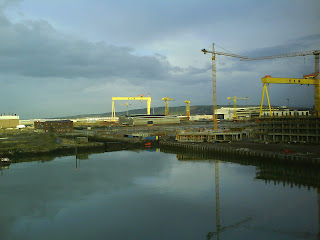 The Minister for Finance made a big announcement this morning on the state of Ireland's finances. Little in his announcement was really unexpected, but the reaction here is as if people were half hoping that things weren't really that bad and that we have been over-reacting. They are and we haven't.
The Minister for Finance made a big announcement this morning on the state of Ireland's finances. Little in his announcement was really unexpected, but the reaction here is as if people were half hoping that things weren't really that bad and that we have been over-reacting. They are and we haven't.What was funny was that as I listened to Minister Brian Lenihan I started singing "Turn out the lights, the party's over" in my best Don Meredith voice. Do you remember Meredith? He was the cowboy (and ex-Cowboy) who was part of the three person team of announcers for Monday Night Football back in the 70s and 80s. When Meredith burst into song the trailing team was usually still playing hard trying to win, but it was all over for them. I couldn't help thinking that's how it feels here today.
The Minister's announcement basically locked in the Irish people - those who are alive and nearly as many again who have yet to be born - to paying back debts they didn't incur on behalf of our criminally mismanaged banks. I know America's banks did stupid things, but American banks did different stupid things than our banks did and American banks were nowhere near as deranged in their pursuit of stupidity.
America's banks were led down the garden path by people who were the new alchemists: technologists who could turn risky loans into safe ones through securitization. Ireland's banks got into trouble because they didn't believe in rainy days and never gave a moment's thought to the fact that a three bedroom townhouse outside Dublin cost more than a three bedroom penthouse on the west side of Manhattan. Just plain D U M.
Now we all have to pay because, well, I'm not sure really. You see our banks are bust for making all those bad loans, but for reasons that escape me the Irish government has decided that those banks and pension funds and others who lent all the money to our banks - I think psychologists call them enablers, but they're really known as senior bondholders - must be repaid at all cost.
Yes, today the Minister announced that
We shall pay on the beaches, we shall pay in the fields and in the streets …The figures are more than daunting. A cool €45bn ($61bn) or so (could be an even €50bn [$68bn] if things break just wrong) is what's supposedly required. That's about €10,000 ($13,600) per person. My family owes an extra €50,000 ($68,000) and, this is the best part, we have nothing to show for all this. Nothing.
You'll often hear people talk about a nation's or state's debts in these terms, but at least they'd have the satisfaction of having better schools or roads or hospitals or whatever. The only other situation that gives rise to such debts is war, which I think our government believes we're in. That might explain all the macho rhetoric.
All we have is the knowledge that German and French politicians and bureaucrats are telling us that we'll be fine and that we should ignore the fact that their bankers will not endure any pain for having stupidly lent all this money to our banks in the first place.
It gets better. This is all just to solve the big boys' problems. As many people on the radio have reminded us this morning, none of this takes into account all those small investors who borrowed money to buy a house or apartment or two as an investment and who now can't repay those loans. And there are many such people. All those bad debts have not yet been reckoned with. So our banks' debts remain unknown unknowns.
There weren't supposed to be any more unknowns - known or unknown - after this morning. The Minister's statement was flagged well in advance as the moment the government would provide clarity so that the markets could settle and we could get started on the decades of work required to turn this around. Unfortunately, all we've learned is that "Never was so much owed by so many to so few."











